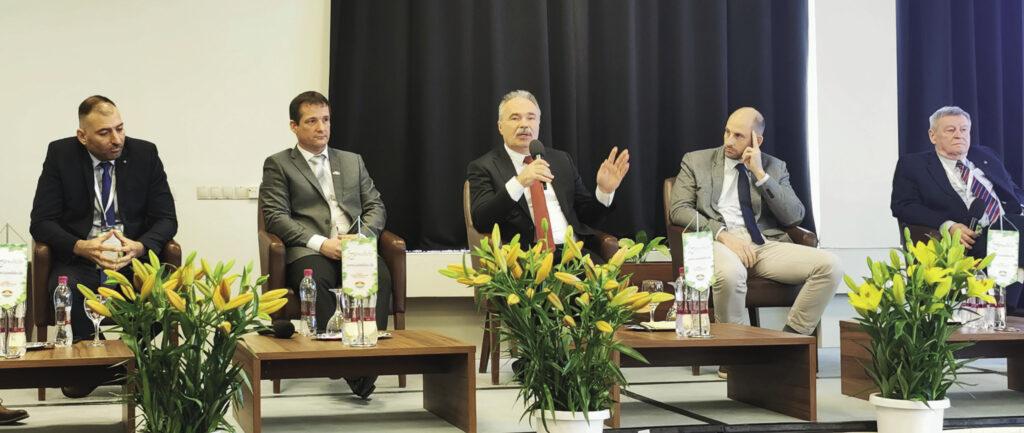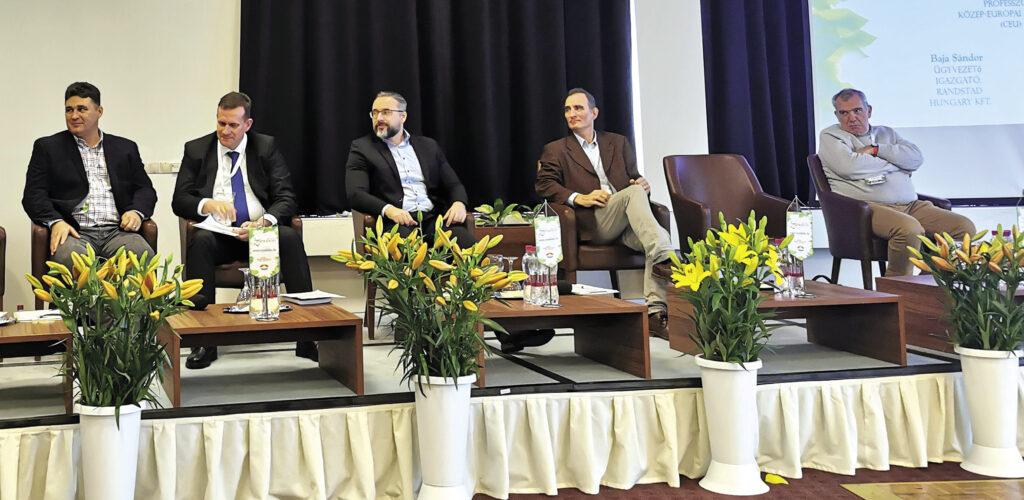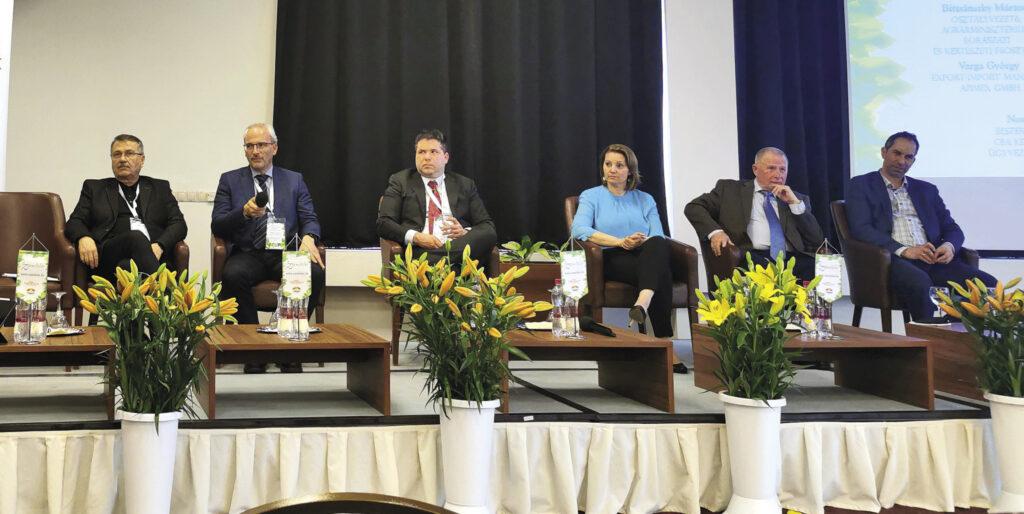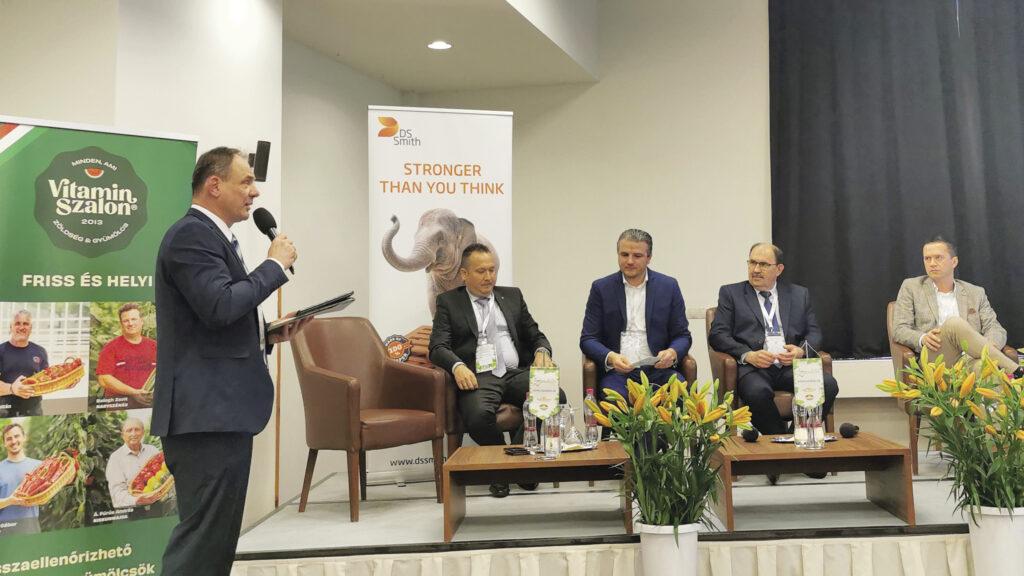Zsendülés conference in Szeged – Organisation, efficiency and cooperation are the future of horticulture
On 2 March about 250 representatives of the horticulture sector gathered for the 8th Zsendülés conference in Szeged.

This article is available for reading in Trade magazin 2023/5
The first speaker was Dávid Németh, senior analyst of K&H Bank. He said we get to choose between two bad things: either we accept the recession or the high inflation rate. All over the world fiscal policy is very supportive, while the monetary policies of governments are becoming stricter.
Minister of Agriculture Dr István Nagy was the chief patron of the conference. In his presentation , the minister underlined that farmers can’t wait any longer with the introduction of precision farming technologies, automation, robotics and digitalisation in fruit and vegetable growing.

The role of producer organisations must go beyond joint selling, participants of the the first roundtable discussion found
Cleaner fruit sector
Dr Ferenc Apáti, president of the FruitVeB Hungarian Interprofessional Organisation for Fruit and Vegetable told: only intensive and yield-reliable methods are pushing the sector forward. The restructuring of the vegetable market has been more or less completed, and it is now the turn of the fruit sector to create new, cleaner conditions – the current economic recession has actually speeded up this process.
A roundtable discussion followed, where Dr Béla Mártonffy, president of the horticulture and supplier division of the Hungarian Chamber of Agriculture (NAK) called attention to the crucial importance of developing Hungary’s processing industry – without this, fruit and vegetable farming can’t make real progress. Zoltán Gubacsi, a member of Kert-Ész Magyarország Association added: what the sector needs isn’t only loans with a good interest rate, but also an increased willingness from banks to finance the sector.
Time’s up
Energy, war, inflation, climate – these stress factors were the topic of the conference’s next section. Dr Péter Tálas, associate professor and director of the Centre for Strategic and Defence Studies stepped on the podium first. He explained that one of the things the current war can decide is whether the world will return to a more violent sphere of interest policy or it will pursue a more peaceful sphere of influence approach. Diána Ürge-Vorsatz, a professor of the Central European University (CEU) spoke about the effects of the global climate change via Skype. She told that the average global temperature hasn’t been this high for 125,000 years, and it can very well happen that a few years from now farmers won’t be able to work on the land during daytime because of the unbearable heat.
Zoltán Kézi, the head of MKB Bank and Takarékbank’s agri-food division in the Southern Great Plain region stressed: funding is perhaps more important now than ever before. Efficiency increasing investments in horticulture have made the sector less exposed to weather extremities.

The second roundtable discussion was themed by the issue of workforce
Change after change
“Change after change” – this is how László Szabó, head of the Regional Centre for Energy Policy Research of Corvinus University of Budapest started his presentation. There is no stability in the market anymore. Although the energy sector has very good adaptation capabilities, the performance of renewable energy is still unsteady at the moment.
In the following roundtable discussion Sándor Baja, managing director of Randstad Hungary Kft. told: the average work hour costs EUR 10.5 for the employer in Hungary, but this sum is EUR 40 in the Netherlands and EUR 35 in Germany. János Nemes-Nagy, the owner of Nemeskert Kft. and a member of Kert-Ész Klub Magyarország Association said the biggest stress for him is finding skilled workers. In his view two things can help to reduce this stress, investment and optimisation.
Households have stepped on the break
In the afternoon Tünde Turcsán, commercial director of GfK Hungária Kft. was the first to give her presentation. She told that the purchasing power of Hungarian consumers is only half of the European Union’s average, but the consumer price index increased the most in our country in the EU (+25.4%). In 82% of Hungarian households the most important product choice factor is now price. In 2022 fruit sales reduced by 16% in value and shoppers purchased 14kg less fruit than in 2021; vegetable sales dropped 11% in value and households bought 17kg less.

Participants of the third round table discussion believe that even if the number of producer organisations is increasing, there is still a shortage of high-quality commodity base
Dr Márton Pál Nobilis, state secretary for the food industry and trade policy at the Ministry of Agriculture talked about the priority of increasing the proportion of Hungarian products in shops; in this respect the fruit and vegetable sector is in a good situation. Another important part of the ministry’s strategy is reducing food waste.
Not an opportunity, but a necessity
During the roundtable discussion Márton Bittsánszky, head of the viticulture and horticulture department at the Ministry of Agriculture broke the news that the number of Producers’ Sales Organisations (TÉSZ) had grown from 33 to 40 this year. Dr László Kovács, facility management director of the Budapest Wholesale Market spoke about their investment in green energy and digitalisation.
András Kálmán, foreign trader of the Cooperative of Horticulturists of the Southern Great Plain called attention to the problem of less high-quality fruit and vegetables being available for export. This means that integration isn’t an opportunity in this situation, but a necessity. György Varga, export-import manager of Apimex GmbH told: they have been working hard recently to enter the German market with new products, but they had to face strong resistance.

Hungarian products need to roll out faster and at a cheaper price, chains said at the fourth roundtable discussion
Will the prices drop?
The next speaker was Gergely Kóra, fruit and vegetable assortment manager of SPAR Magyarország Kereskedelmi Kft. He revealed that – as a reaction to changing consumption habits – in the future they will place bigger emphasis on promoting S-Budget private label products. Zoltán Noszlopy, purchasing director of CBA Kereskedelmi Kft. is worried that fruit and vegetable was in the top 3 of food inflation, in the first two months of 2023.
Zoltán Újszászi, senior purchaser (fruit and vegetables) of Tisza-COOP Zrt. informed that they deliver fruit and vegetables to 250 shops now, to guarantee that shoppers can choose from fresh and high-quality produce. Tamás Feczák, managing director of Hódkertész Kft. opined that producers and retailers should cooperate in the long run if they want a more balanced price level. //
Related news
We have already announced a tender worth 1,500 billion forints for the development of agriculture
Within the framework of the Common Agricultural Policy Strategic Plan,…
Read more >Irrigation water resources equivalent to one-third of Lake Balaton are available
Despite the extreme drought and lack of precipitation, we can…
Read more >András Tállai: “There is strong intent and potential for development in the sector”
András Tállai, state secretary of the Ministry of Agriculture talked…
Read more >Related news
Corporate leaders’ commitment to sustainability at record level
According to the latest data from the K&H Sustainability Index,…
Read more >FAO food price index rose slightly in June due to higher prices of meat, dairy products and vegetable oils
The Food and Agriculture Organization of the United Nations (FAO)…
Read more >What can cause the price of a wine to increase tenfold?
There are fewer of them worldwide than the number of…
Read more >






